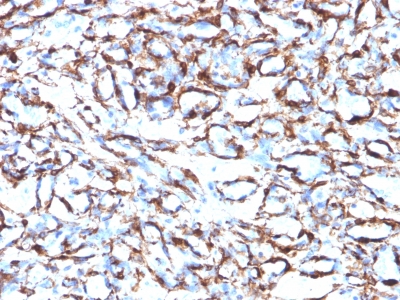Human, Rat, and Broad Species Reactivity Anti-Actin, Smooth Muscle Antibody Product Attributes
Actin, Smooth Muscle Previously Observed Antibody Staining Patterns
Observed Antibody Staining Data By Tissue Type:
Variations in Actin, Smooth Muscle antibody staining intensity in immunohistochemistry on tissue sections are present across different anatomical locations. An intense signal was observed in myoepithelial cells in the breast and smooth muscle cells in the smooth muscle. More moderate antibody staining intensity was present in myoepithelial cells in the breast and smooth muscle cells in the smooth muscle. Low, but measureable presence of Actin, Smooth Muscle could be seen in. We were unable to detect Actin, Smooth Muscle in other tissues. Disease states, inflammation, and other physiological changes can have a substantial impact on antibody staining patterns. These measurements were all taken in tissues deemed normal or from patients without known disease.
Observed Antibody Staining Data By Tissue Disease Status:
Tissues from cancer patients, for instance, have their own distinct pattern of Actin, Smooth Muscle expression as measured by anti-Actin, Smooth Muscle antibody immunohistochemical staining. The average level of expression by tumor is summarized in the table below. The variability row represents patient to patient variability in IHC staining.
| Sample Type | breast cancer | carcinoid | cervical cancer | colorectal cancer | endometrial cancer | glioma | head and neck cancer | liver cancer | lung cancer | lymphoma | melanoma | ovarian cancer | pancreatic cancer | prostate cancer | renal cancer | skin cancer | stomach cancer | testicular cancer | thyroid cancer | urothelial cancer |
|---|---|---|---|---|---|---|---|---|---|---|---|---|---|---|---|---|---|---|---|---|
| Signal Intensity | – | – | – | – | – | – | – | – | – | – | + | – | – | – | – | ++ | – | – | – | – |
| ACTA2 Variability | ++ | + | ++ | ++ | + | + | + | + | ++ | ++ | ++ | + | + | + | + | +++ | + | + | ++ | + |
| Actin, Smooth Muscle General Information | |
|---|---|
| Alternate Names | |
| Alpha-actin-2, actinaortic smooth muscle, alpha smooth muscle actin, ASMA, ACTA2 | |
| Molecular Weight | |
| 42kDa | |
| Chromosomal Location | |
| 10q23.31 | |
| Curated Database and Bioinformatic Data | |
| Gene Symbol | ACTA2 |
| Entrez Gene ID | 59 |
| Ensemble Gene ID | ENSG00000107796 |
| RefSeq Protein Accession(s) | NP_001135417, NP_001604, NP_001307784 |
| RefSeq mRNA Accession(s) | NM_001141945 NM_001613, NM_001320855 |
| RefSeq Genomic Accession(s) | NC_000010, NC_018921, NG_011541 |
| UniProt ID(s) | P03996, P04108, D2JYH4, P62736 |
| UniGene ID(s) | P03996, P04108, D2JYH4, P62736 |
| HGNC ID(s) | 130 |
| Cosmic ID(s) | ACTA2 |
| KEGG Gene ID(s) | hsa:59 |
| PharmGKB ID(s) | PA24456 |
| General Description of Actin, Smooth Muscle. | |
| Actin is a major component of the cytoskeleton, is present in most cell types. It is highly specific to actin from smooth muscles. This MAb does not stain cardiac or skeletal muscle; however, it does stain myofibroblasts, myoepithelial cells. This antibody could be used together with anti-muscle specific actin, myogenin in making a diagnosis of smooth muscle, skeletal muscle tumors. In most cases of rhabdomyosarcoma, this antibody yields negative results whereas anti-muscle specific actin, myogenin are positive. Leiomyosarcomas are positive only with anti-muscle specific actin, anti-smooth muscle actin, are negative with anti-myogenin. | |

.jpg)

.jpg)
.jpg)
.jpg)

-150x150.jpg)
-150x150.jpg)

There are no reviews yet.